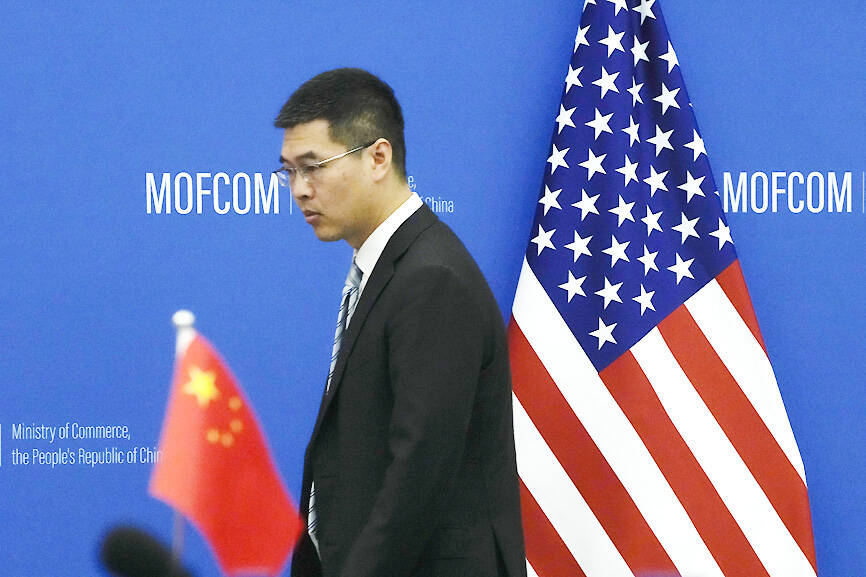US firms in China are reporting “record-low” optimism and are increasingly looking to move investment away from the country, as slowing growth and geopolitical tensions hurt investor confidence, the American Chamber of Commerce (AmCham) Shanghai said in a report released yesterday.
The findings by AmCham Shanghai come as the government enacts a series of measures to prop up the sluggish economy.
AmCham Shanghai said that “2023 was supposed to be the year investor confidence and optimism bounced back after years of COVID disruptions and restrictions.”

Photo: EPA-EFE
“According to our 2023 survey of US businesses in China, however, the rebound has not materialized and business sentiment has continued to deteriorate,” it said.
Tensions between Beijing and Washington are also weighing heavily on US businesses in China, AmCham Shanghai said.
Respondents’ optimism about the next five years was the lowest ever recorded in the survey, with just 52 percent saying they had an optimistic outlook, down 3 percentage points from a year earlier, the report said.
Last year, those surveyed expected a post-COVID-19 rebound, but by the time the survey was conducted this June, “a lot of the illusions had sort of fallen away, where we thought there was going to be a real sustained rebound,” AmCham Shanghai chairman Sean Stein told a news conference on Monday.
Asked to pick the top three challenges to their company, 60 percent of the 325 businesses that responded to the survey chose US-China relations, while the same amount pointed to the economic slowdown.
Four out of 10 companies were planning or already in the process of redirecting their investment away from China to other countries, up 6 percentage points from last year, with Southeast Asia the top alternative destination.
Two-thirds of respondents under pressure to decouple from the Chinese market had pointed to US policy as the largest push factor, rather than Beijing policy, AmCham Shanghai said.
Despite rising uncertainty, a series of visits by senior US officials to China this summer, including US Secretary of Commerce Gina Raimondo, as well as the release last month of the Chinese State Council’s 24 measures to promote foreign investment, have all been positive signals, AmCham Shanghai said.

To many, Tatu City on the outskirts of Nairobi looks like a success. The first city entirely built by a private company to be operational in east Africa, with about 25,000 people living and working there, it accounts for about two-thirds of all foreign investment in Kenya. Its low-tax status has attracted more than 100 businesses including Heineken, coffee brand Dormans, and the biggest call-center and cold-chain transport firms in the region. However, to some local politicians, Tatu City has looked more like a target for extortion. A parade of governors have demanded land worth millions of dollars in exchange

An Indonesian animated movie is smashing regional box office records and could be set for wider success as it prepares to open beyond the Southeast Asian archipelago’s silver screens. Jumbo — a film based on the adventures of main character, Don, a large orphaned Indonesian boy facing bullying at school — last month became the highest-grossing Southeast Asian animated film, raking in more than US$8 million. Released at the end of March to coincide with the Eid holidays after the Islamic fasting month of Ramadan, the movie has hit 8 million ticket sales, the third-highest in Indonesian cinema history, Film

Taiwan Semiconductor Manufacturing Co’s (TSMC, 台積電) revenue jumped 48 percent last month, underscoring how electronics firms scrambled to acquire essential components before global tariffs took effect. The main chipmaker for Apple Inc and Nvidia Corp reported monthly sales of NT$349.6 billion (US$11.6 billion). That compares with the average analysts’ estimate for a 38 percent rise in second-quarter revenue. US President Donald Trump’s trade war is prompting economists to retool GDP forecasts worldwide, casting doubt over the outlook for everything from iPhone demand to computing and datacenter construction. However, TSMC — a barometer for global tech spending given its central role in the

Alchip Technologies Ltd (世芯), an application-specific integrated circuit (ASIC) designer specializing in server chips, expects revenue to decline this year due to sagging demand for 5-nanometer artificial intelligence (AI) chips from a North America-based major customer, a company executive said yesterday. That would be the first contraction in revenue for Alchip as it has been enjoying strong revenue growth over the past few years, benefiting from cloud-service providers’ moves to reduce dependence on Nvidia Corp’s expensive AI chips by building their own AI accelerator by outsourcing chip design. The 5-nanometer chip was supposed to be a new growth engine as the lifecycle